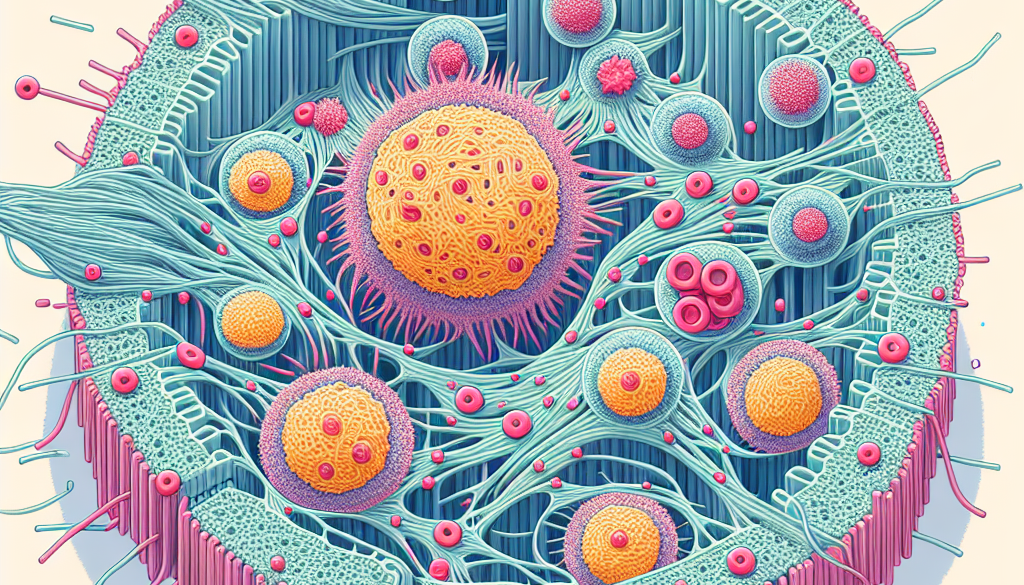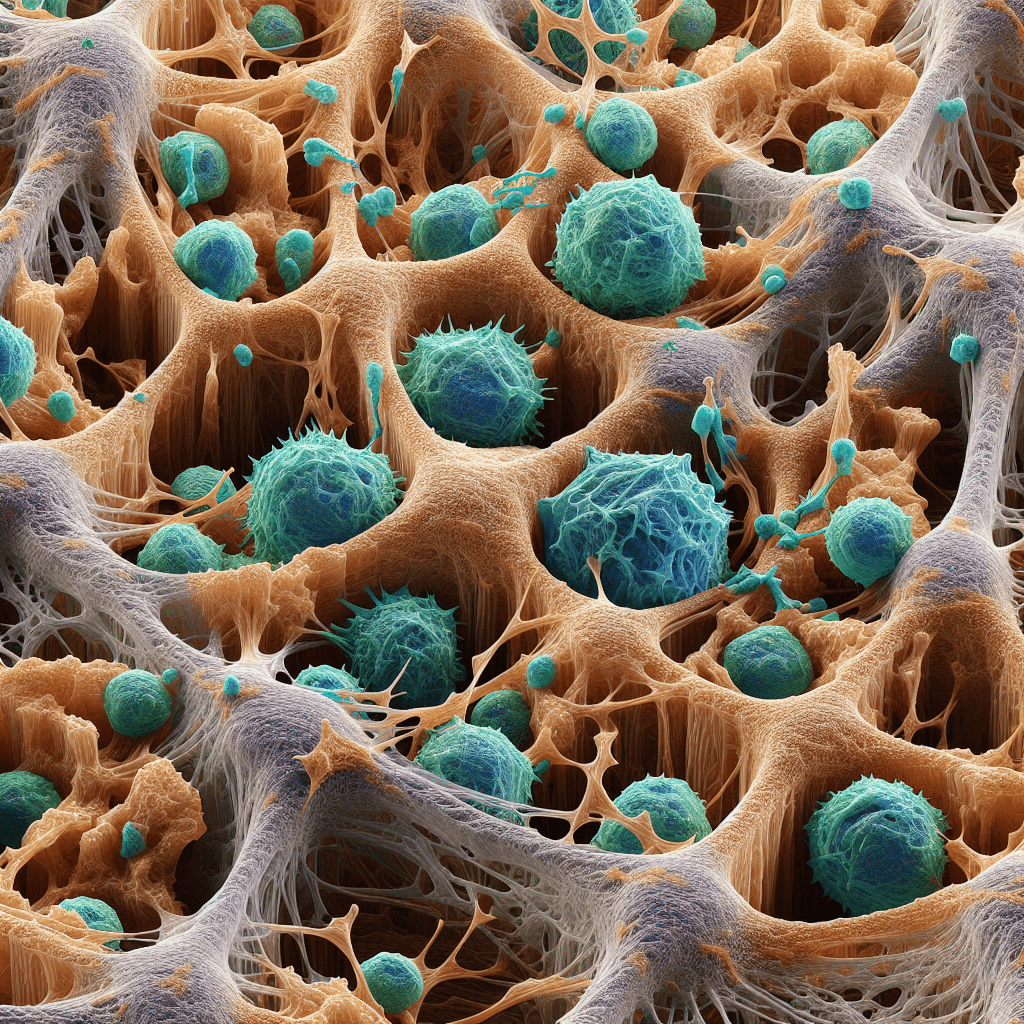T Cell Collagen Fibril Organization: Understanding the Impact
-
Table of Contents
- T Cell Collagen Fibril Organization: Exploring Its Crucial Role
- Introduction to T Cells and Collagen Fibrils
- The Interaction Between T Cells and Collagen Fibrils
- Impact on T Cell Migration
- Collagen Fibril Remodeling by T Cells
- Implications for Health and Disease
- Autoimmune Diseases
- Cancer Progression
- Tissue Engineering and Regenerative Medicine
- Case Studies and Research Findings
- Conclusion: Key Takeaways
- Discover ETChem’s High-Quality Protein Products
T Cell Collagen Fibril Organization: Exploring Its Crucial Role
The intricate world of cellular biology is a testament to the complexity and precision of life at the microscopic level. Among the various cellular components, T cells and collagen fibrils play pivotal roles in the body’s immune response and structural integrity, respectively. Understanding the impact of T cell interactions with collagen fibril organization is not only a fascinating subject within the field of immunology but also has significant implications for medical research and treatment strategies. This article delves into the nuances of this relationship, exploring how T cells influence collagen fibril organization and the broader implications for health and disease.
Introduction to T Cells and Collagen Fibrils
Before we examine the interaction between T cells and collagen fibrils, it is essential to understand the fundamental roles each plays within the body.
- T Cells: T cells, or T lymphocytes, are a type of white blood cell that plays a central role in the immune system. They are responsible for identifying and destroying infected or cancerous cells and coordinating the immune response.
- Collagen Fibrils: Collagen is the most abundant protein in the animal kingdom, providing structural support to various tissues, including skin, bone, and tendons. Collagen fibrils are long, thin strands of protein that aggregate to form larger fibers, giving tissues their strength and elasticity.
The Interaction Between T Cells and Collagen Fibrils
The interaction between T cells and collagen fibrils is a subject of ongoing research. T cells must navigate the extracellular matrix (ECM), a complex network of proteins including collagen, to reach their target sites. The organization of collagen fibrils within the ECM can influence T cell movement and function.
Impact on T Cell Migration
T cells migrate through tissues to patrol for pathogens or to reach sites of inflammation. The density and orientation of collagen fibrils can either facilitate or impede this migration. Studies have shown that:
- T cells preferentially migrate along the paths of least resistance, often following the alignment of collagen fibrils.
- Dense collagen networks can act as barriers, redirecting T cell movement or preventing access to certain areas.
- Changes in collagen density and stiffness, due to disease or injury, can alter T cell migration patterns and impact immune responses.
Collagen Fibril Remodeling by T Cells
T cells are not merely passive travelers within the ECM; they can actively remodel the collagen fibril landscape. Through the secretion of matrix metalloproteinases (MMPs), T cells can degrade collagen fibrils, clearing a path for migration or modulating the ECM to support immune functions.
Implications for Health and Disease
The dynamic interplay between T cells and collagen fibrils has profound implications for various health conditions and diseases.
Autoimmune Diseases
In autoimmune diseases, such as rheumatoid arthritis, T cells target the body’s own tissues, leading to chronic inflammation and ECM remodeling. The altered collagen fibril organization can exacerbate disease progression by facilitating the infiltration and retention of T cells in the affected tissues.
Cancer Progression
The tumor microenvironment often features altered collagen fibril organization, which can affect T cell infiltration and activity. Understanding how T cells navigate and remodel cancer-associated collagen networks is crucial for developing therapies that enhance anti-tumor immune responses.
Tissue Engineering and Regenerative Medicine
Insights into T cell-collagen interactions are also valuable for tissue engineering. By designing scaffolds with specific collagen fibril orientations and densities, scientists can influence T cell behavior, potentially improving tissue regeneration and immune integration.
Case Studies and Research Findings
Several studies have highlighted the significance of T cell-collagen fibril interactions:
- A study published in the journal Immunity demonstrated that T cells can use collagen fibers as highways to navigate through tissues more efficiently.
- Research in The Journal of Clinical Investigation found that the stiffness of the ECM, influenced by collagen organization, can modulate T cell activation and differentiation.
- A groundbreaking study in Nature Communications revealed that T cells can remodel the ECM by exerting mechanical forces, influencing their own migration and the migration of other cells.
Conclusion: Key Takeaways
The relationship between T cells and collagen fibril organization is a complex and dynamic one, with significant implications for our understanding of the immune system and the development of medical interventions. Key takeaways include:
- T cell migration is influenced by the organization of collagen fibrils within the ECM.
- T cells can actively remodel the collagen network, impacting their function and the overall tissue architecture.
- Altered collagen fibril organization plays a role in various diseases, including autoimmune disorders and cancer.
- Understanding T cell-collagen interactions is crucial for advancing tissue engineering and regenerative medicine.
As research continues to unravel the complexities of T cell-collagen fibril interactions, new therapeutic avenues are likely to emerge, offering hope for improved treatments for a range of diseases.
Discover ETChem’s High-Quality Protein Products
For researchers and industry professionals looking to explore the world of proteins, ETChem offers a wide range of high-quality collagen products. Their extensive selection includes marine collagen, fish collagen, bovine collagen, and more, suitable for various applications in nutraceuticals, pharmaceuticals, and other industries. With a commitment to excellence and customer satisfaction, ETChem is your go-to source for all your protein needs.
About ETChem:
ETChem, a reputable Chinese Collagen factory manufacturer and supplier, is renowned for producing, stocking, exporting, and delivering the highest quality collagens. They include marine collagen, fish collagen, bovine collagen, chicken collagen, type I collagen, type II collagen and type III collagen etc. Their offerings, characterized by a neutral taste, instant solubility attributes, cater to a diverse range of industries. They serve nutraceutical, pharmaceutical, cosmeceutical, veterinary, as well as food and beverage finished product distributors, traders, and manufacturers across Europe, USA, Canada, Australia, Thailand, Japan, Korea, Brazil, and Chile, among others.
ETChem specialization includes exporting and delivering tailor-made collagen powder and finished collagen nutritional supplements. Their extensive product range covers sectors like Food and Beverage, Sports Nutrition, Weight Management, Dietary Supplements, Health and Wellness Products, ensuring comprehensive solutions to meet all your protein needs.
As a trusted company by leading global food and beverage brands and Fortune 500 companies, ETChem reinforces China’s reputation in the global arena. For more information or to sample their products, please contact them and email karen(at)et-chem.com today.


